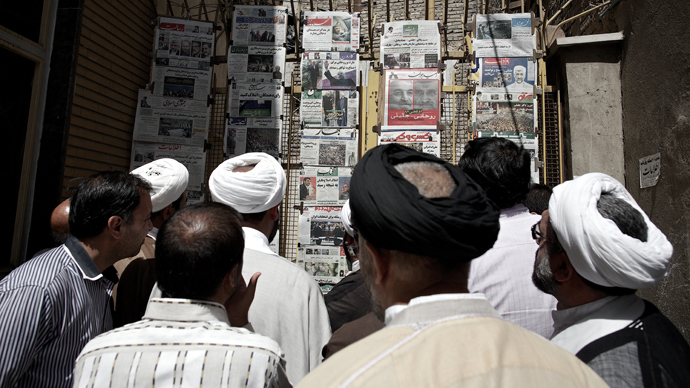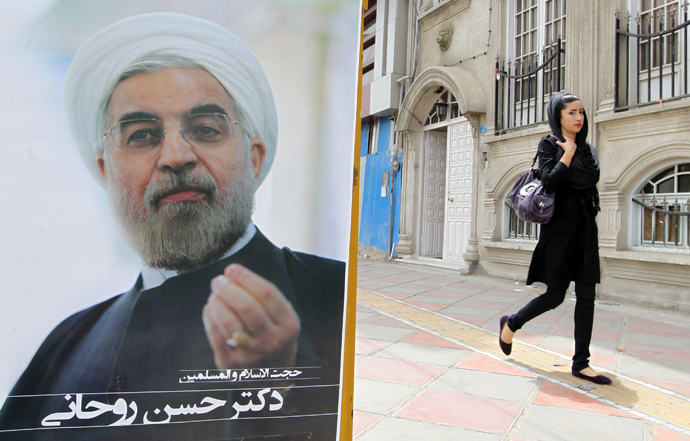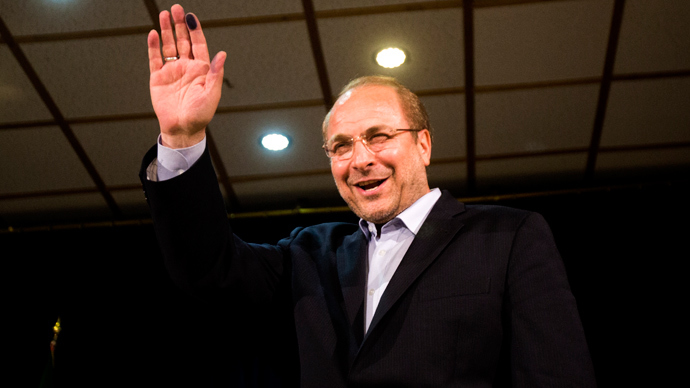Centrifugal force puts spin on Iran presidential election

No question: the 11th presidential election in the Islamic Republic of Iran (IRI) this Friday is going to be a cliffhanger.
Campaigning has been extremely lively. Last-minute polls predict a run off. Yes, this is democracy with Iranian characteristics; imagine something remotely similar happening in the neo-medieval House of Saud or the Persian Gulf petro-monarchies.
The last-minute plot twist has pragmatic conservative Hassan Rowhani – a former head of the National Security Council (1989-2005) - being endorsed by reformist former President Mohammad ‘Dialogue of Civilizations’ Khatami and none other than The Shark himself, also-former-President Hashemi Rafsanjani, who was disqualified by the Guardian Council. As an extra bonus, what could be described as the lone reformist candidate, Mohammad Reza Aref, dropped out.

Supreme Leader Ayatollah Khamenei may be excused to wonder things are not exactly going according to script. His script.
The affable Rowhani, 65, is essentially a moderate cleric (the
only one among the candidates, by the way), reform-minded and,
crucially, a close ally of Rafsanjani. Under Khatami, he was a
nuclear negotiator. In three recent debates on national
television, he has promised to avoid “noisy rhetoric” in foreign
policy, to “normalize” relations with the West and even to try to
spring Green movement leaders Mir Hossein Mousavi and Mehdi
Karroubi out of house arrest.
He’s also in favor of freedom of the press. Arguably the whole reformist movement will vote for him in bulk – especially after Khatami’s call, which addressed, “In particular those who seek the dignity and elevation of the nation.”
Here’s Rowhani’s best catch phrase so far, in a debate last Friday: “It is good to have centrifuges running, provided people's lives and livelihoods are also running." And his supporters are wearing purple wristbands – a parallel reminiscence of the 2009 Green movement. No wonder panic is the word in selected Tehran corridors. But Tehran, as we all know, is not Iran.
Pick the leader’s horse
The conservatives, for their part, are split. The former mayor of Tehran, Mohammad Ghalibaf, also a former head of the Islamic Revolutionary Guard Corps (IRGC) Air Force, might stand a chance of at least getting into a runoff with Rowhani because the Sepah (as the IRGC is popularly referred to) holds him dear.
Yet the front-runner is Iran’s current top nuclear negotiator, Saeed Jalili, 48. Jalili is also a close ally of Khamenei; he ran Khamenei’s office from 2001 to 2005 and has already announced he will "stand up to the West."

The Supreme Leader insisted he has no horse in this race. Word in the street in Tehran is his candidate is Jalili. Word in rarified power corridors says his candidate is actually Ali Akbar Velayati, 68, a former foreign minister for more than 16 years and currently Khamenei’s top foreign policy adviser. Velayati promised he would try to end the Syrian tragedy working side-by-side with the West.
So Velayati would be like the ideal compromise between Rowhani and Jalili. He’s been on the offensive. In one of the debates last week he openly dismissed Jalili; “The art of diplomacy is to preserve our nuclear rights, not to see sanctions increase.”
Rowhani also indirectly torpedoed Jalili’s narrow vision, stressing on the subject of universities under strict vigilance, “What’s behind the brain drain? We’ve created a one-way street, driving our academic minds away, a loss of investment for Iran.”
The Jalili camp found no better counter-argument than to accuse Rowhani of having made previous nuclear concessions without Khamenei’s approval.
As for the immensely turbulent Ahmadinejad years, what all actors can say is “Thank Allah it’s over.” No more ideology. Apart from Jalili, all candidates are pragmatists.
Once again; is this democracy? The problem is the West never bothered to understand how the IRI works. Here’s a fascinating description (in German). One may not agree with many issues - but if only Western chancelleries and media would encourage a debate.
You can’t eat a centrifuge
Kaveh Afrasiabi argues this will be a national referendum on Iran’s nuclear diplomacy. No question. After all, the Obama administration is also participating in the election after the president signed yet another executive order, this time targeting Iran’s currency, the rial.
The White House advertised its new sanctions package as applying to “foreign financial institutions that purchase or sell significant amounts of the rial, and to those who hold significant amounts of the rial in accounts outside Iran.” The objective is to prevent the rial from being used outside of Iran (not that it has been, recently).
The bottom line; this is economic war. Not against the leadership in Tehran (because they can easily dribble it), but against average Iranians. Food prices - chicken, meat, cooking oil, already up by more than 60 percent this year - will skyrocket.

So no wonder Khamenei wants what would be the best of both worlds; a moderate but loyal president, capable of at least managing, if not attenuating, the formidable, relentless US/EU pressure. And then there is hardcore geopolitics – as in Iran making sure ally Syria recovers at least some stability.
The problem is the Supreme Leader wants no surprises – like
Khatami winning in 1997 and 2001 or, worse still, the Green
movement surge in 2009. There’s no guarantee Purple movement
Rowhani will be a Khamenei puppet.
2009 was a major turning point in the IRI’s history. The system
hemorrhaged credibility – especially in the West, but also in
Iran’s big cities. It increasingly relied on brute force. It
turned even more sharply to the right. And the Sepah sort of took
over – emphasizing Khamenei’s dependence. The ultra-conservatives
monopolize all power while legions of young, well-educated,
middle-class Iranians are totally excluded.
Since 2009 I have chosen to describe the IRI’s system as a military dictatorship of the ‘mullahtariat’, with the IRGC controlling much of the economy. But they badly need better managers; the Ahmadinejad team was a disaster. A less confrontational foreign policy may translate into a healthier economy. Turnout in this election once again will be key. The evidence seems to indicate that for most Iranians a good affordable meal is as good, if not better, than a centrifuge.
The statements, views and opinions expressed in this column are solely those of the author and do not necessarily represent those of RT.
The statements, views and opinions expressed in this column are solely those of the author and do not necessarily represent those of RT.













